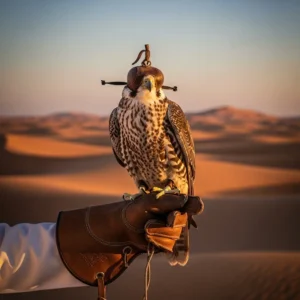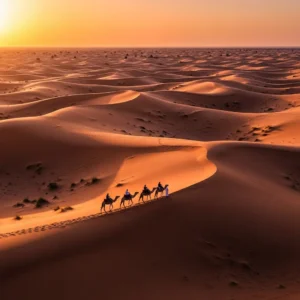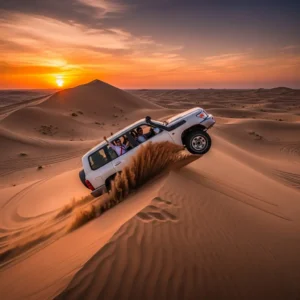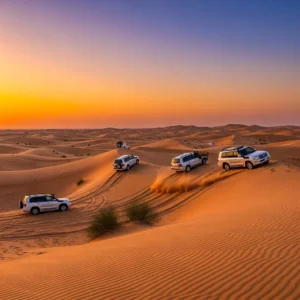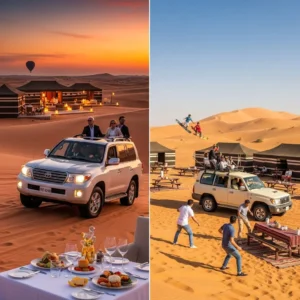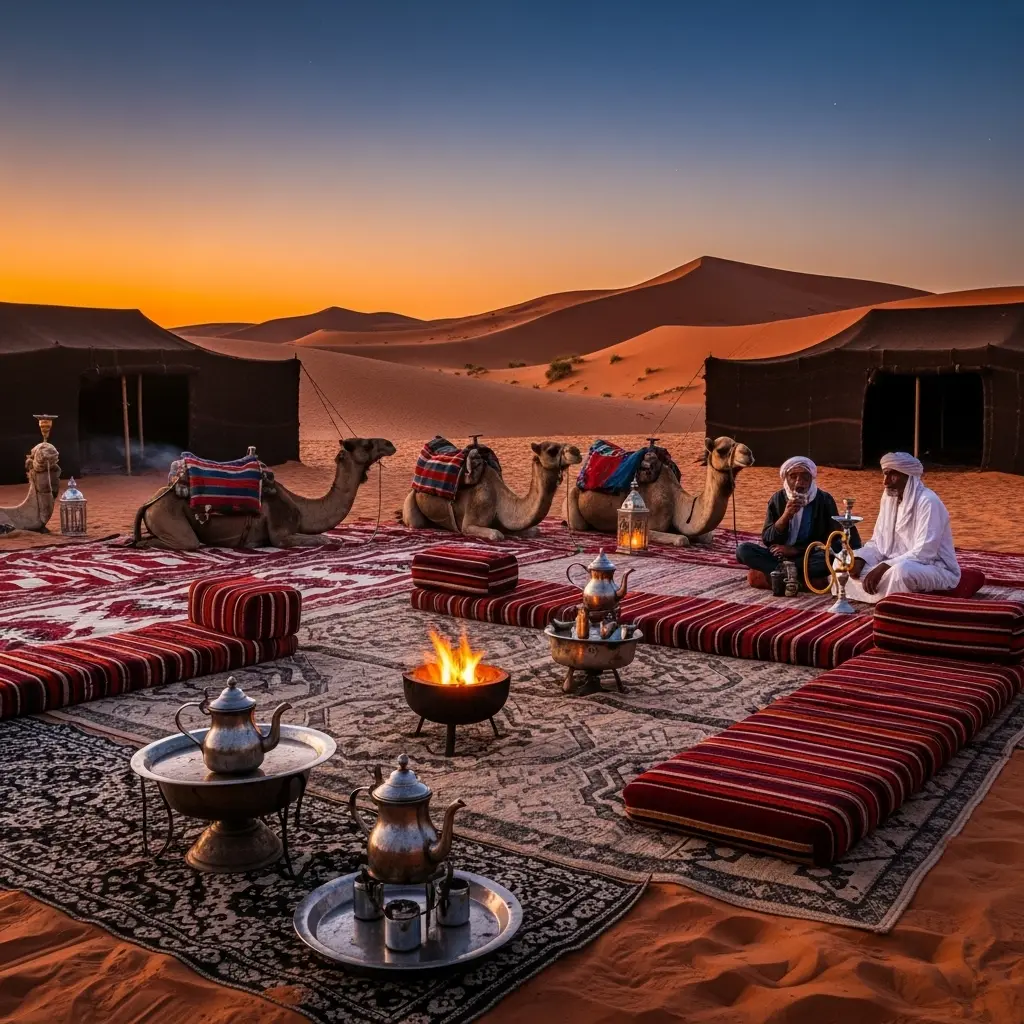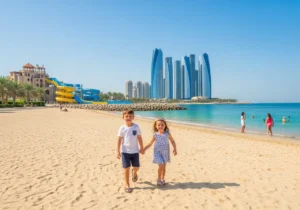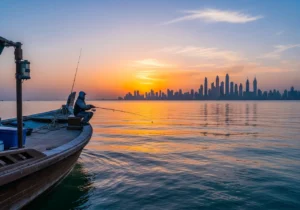A Guide to the Traditional Bedouin Camp Experience: 10 Things to Expect
After the exhilarating rush of dune bashing and the serene beauty of a desert sunset, your 4×4 vehicle will make its way towards a gentle glow of light nestled amongst the dunes. This is your destination for the evening: a traditional Bedouin-style camp. This enchanting oasis is the cultural heart of the desert safari, a place designed to immerse you in the timeless hospitality and rich traditions of the Arabian Peninsula.
But what exactly awaits you inside? For a first-time visitor, the concept of a desert camp can be mysterious. This guide is designed to be your virtual tour, a detailed, moment-by-moment exploration of what to expect from a truly memorable Bedouin camp experience.
From the initial welcome to the final, spectacular fire show, we will break down the ten key components that make up this magical evening. Understanding what’s in store will not only build your anticipation but also help you choose a tour that delivers a high-quality, authentic, and unforgettable night under the desert stars.
1. The Arrival: A Traditional Arabian Welcome
Your Bedouin camp experience begins the moment you step out of your vehicle. You are not just arriving at a venue; you are being welcomed into a space of hospitality.
- The Ritual of Gahwa and Dates: You will be greeted at the entrance in the traditional Emirati way, with a serving of aromatic Arabic coffee, known as ‘Gahwa’. This lightly roasted, cardamom-infused coffee is a symbol of hospitality. It is served in a small, handleless cup. Alongside the coffee, you will be offered sweet, nutritious dates, another cornerstone of Bedouin culture. Accepting this offering is a sign of respect and the perfect start to your cultural immersion.
- First Impressions: As you walk into the camp, you’ll be struck by the enchanting atmosphere. The layout is typically a large, open courtyard centered around a main stage. The ground is covered in beautiful, intricate carpets, and seating is provided on low cushions and tables in the ‘majlis’ style, creating a relaxed and communal feel. The air is filled with the gentle aroma of burning bakhoor (incense) and the sound of soft, traditional Arabic music.
2. The Seating: Relaxing in the Majlis
The seating arrangement is a key part of the Bedouin camp experience. The ‘majlis’ is a traditional Arabic seating area, a place for community, conversation, and relaxation. Low tables are surrounded by comfortable cushions and carpets, encouraging a laid-back and social atmosphere. You can choose your spot, settle in, and begin to soak in the magical ambiance as the evening unfolds.
3. Cultural Activities: A Hands-On Immersion
Before dinner and the main entertainment, you will have free time to explore the various activity stations set up around the perimeter of the camp.
- A Gentle Camel Ride: The camp will have a dedicated area for short camel rides. This is a fantastic opportunity, especially for families, to experience riding these gentle giants and to capture some classic desert photos.
- The Art of Henna: You can get a beautiful, temporary tattoo from a professional henna artist. Henna is a natural plant-based dye used for centuries for body art in the region. The complimentary design is usually a small, intricate pattern on the hand or fingers.
- Dressing in Tradition: For a fun photo opportunity, you can try on traditional Emirati attire. There will be a station with ‘Kanduras’ (the white robes for men) and ‘Abayas’ (the black outer garments for women) available for you to wear and take pictures in.
- The Aroma of Shisha: A designated Shisha corner is a standard feature. Here, you can try the traditional Middle Eastern water pipe, available with various fruit-flavored tobaccos. It is a relaxing and social part of the evening.
4. The Culinary Journey: The Barbecue Buffet Dinner
The feast is a central part of any authentic Bedouin camp experience. After you’ve explored the activities, the call for dinner will be made, and a lavish buffet will be unveiled.
- The Appetizers (Mezze): The meal begins with a wonderful selection of cold and hot appetizers. You can expect fresh salads like Fattoush and Tabbouleh, creamy hummus, smoky Moutabel (eggplant dip), and warm, fluffy Arabic bread. Hot starters often include delicious cheese or meat-filled pastries (sambousek) and falafel.
- The Main Event: Live BBQ Station: The highlight of the buffet is the live grilling station. Here, chefs will be barbecuing a mouthwatering selection of meats. This typically includes succulent chicken skewers (Shish Tawook), flavorful lamb kebabs, and beef patties.
- A Feast for Vegetarians: A common concern is the availability of vegetarian food. A quality Bedouin camp experience will always include an extensive and delicious selection of vegetarian main courses, such as vegetable curries, lentil stews (dal), sautéed vegetables, and pasta or noodle dishes.
- Desserts: To finish your meal, there will be a selection of fresh fruits and traditional Arabic sweets, such as the famous ‘Luqaimat’ – sweet, sticky dumplings that are a local favorite.
5. Unlimited Refreshments
Throughout the evening, you will have access to unlimited soft drinks and water. A self-service station is always available, offering bottled water, popular sodas, and often tea and coffee as well, ensuring you stay hydrated and refreshed throughout your time in the desert.
6. The Mesmerizing Tanura Dance
As dinner service winds down, the main entertainment begins. The first performance is typically the Tanura dance, a captivating and visually stunning folk dance with roots in Sufi traditions.
A male performer wearing a heavy, intricately designed, and colorful skirt will take to the stage. He begins to spin, and as he picks up speed, the skirt fans out, creating mesmerizing patterns and illusions. The dance is a display of incredible balance, endurance, and artistry, often enhanced by lights woven into the costume. This is a hypnotic and unforgettable part of the Bedouin camp experience.
7. The Enchanting Belly Dance Performance
Following the Tanura, the stage is taken by a professional belly dancer. This art form, famous throughout the Middle East, is a graceful and expressive dance set to enchanting Arabic music. The dancer’s skill, intricate costumes, and engaging performance add a touch of glamour and classic Arabian Nights magic to the evening.
8. The Thrilling Fire Show
The grand finale of the entertainment is a spectacular and daring fire show. A skilled performer will captivate the audience by manipulating fire in a series of thrilling acts. This high-energy performance, involving fire eating, fire breathing, and dancing with flaming props against the dark desert night, is a dramatic and exciting conclusion to the evening’s shows.
9. Stargazing in the Desert Night
After the formal entertainment concludes, take a moment to step away from the center of the camp, let your eyes adjust, and look up. Away from the light pollution of Dubai, the desert sky reveals a breathtaking celestial display. You will see thousands of stars with a clarity that is simply not possible in the city. This quiet moment of stargazing is a peaceful and humbling end to your Bedouin camp experience.
10. The Journey Home
After an evening filled with culture, food, and entertainment, your safari guide will escort you back to your 4×4 vehicle for the comfortable, air-conditioned journey back to your hotel in Dubai, leaving you with a treasure trove of unforgettable memories.
Finding an Authentic Camp
It’s important to note that the quality of the Bedouin camp experience can vary greatly. A top-tier operator like https://royaldesertadventures.ae/ invests heavily in creating an authentic, clean, and comfortable environment. When browsing tours on platforms like https://dubaidesertsafarie.com/ or https://hafiztourism.com/, it’s wise to look for reviews that specifically praise the quality of the camp, the food, and the performers.
Conclusion: The Heart of the Arabian Adventure
The traditional Bedouin camp is so much more than just a dinner venue; it is the vibrant, beating heart of the entire desert safari. It’s where adventure meets culture, where the thrills of the dunes give way to the warmth of Emirati hospitality. It’s a multi-sensory journey filled with delicious tastes, enchanting sights, and captivating sounds. A well-executed Bedouin camp experience is what elevates a desert safari from a simple tour to a magical and cherished memory of your time in Dubai.
Frequently Asked Questions (FAQs)
1. What exactly is a “majlis” style seating? A ‘majlis’ is a traditional Arabic term for a sitting room or a special place where guests are received and entertained. In a desert camp context, it refers to the low seating arrangement on the ground, with beautiful carpets, plush cushions, and low tables. It encourages a relaxed, communal, and traditional atmosphere.
2. Is the food served at the camp authentic Emirati food? The buffet is typically a mix of popular Pan-Arabian and international dishes to cater to a wide range of tastes. You will find many authentic Middle Eastern dishes like hummus, kebabs, and Shish Tawook. While not exclusively Emirati, the menu is designed to give you a delicious taste of the region’s culinary flavors.
3. Are the Tanura and Belly Dance performances culturally authentic? Yes. The Tanura dance is an authentic folk dance with deep cultural roots in the region. Belly dancing is a famous art form across the entire Middle East. Reputable safari operators hire professional and skilled performers who are experts in these traditional art forms to ensure an authentic Bedouin camp experience.
4. What are the toilet facilities like at a Bedouin camp? All licensed and professional desert safari camps have modern, permanent restroom facilities. You can expect clean, separate washrooms for men and women with flushing toilets and running water for handwashing. They are not portable or primitive toilets.
5. Is the camp wheelchair accessible? While the sandy terrain can be challenging, most camps make efforts to be accessible. They often have ramps and accessible restroom facilities. It’s essential to contact your tour operator, like https://royaldesertadventures.ae/, in advance to discuss your specific accessibility needs so they can make the necessary arrangements.
6. Can I buy souvenirs at the camp? Yes, most camps have a small souvenir shop where you can purchase local handicrafts, sand art bottles, traditional scarves, and other keepsakes. They also often have a station where you can buy the professional photographs taken during the evening.
7. Is the entertainment the same every single night? The three core performances—Tanura, belly dance, and a fire show—are standard at almost every evening safari camp. The individual performers may vary from night to night, but the types of shows offered are a consistent and expected part of the Bedouin camp experience.
8. Is the camp very crowded? This depends entirely on the tour operator you choose. Budget operators often use massive camps that can feel very crowded, with long queues for food and activities. More premium operators use smaller, more exclusive camps to ensure a more comfortable and intimate atmosphere for their guests.
9. Is there a dress code for the camp? While there is no strict dress code, it is recommended to dress respectfully. Casual, comfortable clothing is perfectly fine. It is a good idea to bring a light jacket or shawl, as the desert can get cool in the evening, even in warmer months.
10. How long do we actually spend at the Bedouin camp? You will typically spend about 3 to 4 hours at the camp itself. This gives you ample time to enjoy all the activities, have a leisurely dinner, watch the entertainment, and relax before the journey back to the city.
11. Is the camp located deep in the desert? Again, this depends on the operator. High-quality camps are situated in locations that feel remote and are away from the lights and sounds of the city to provide an authentic experience. Some budget camps, however, may be located closer to highways.
12. Is the camp safe for children and families? Yes, the camps are very safe and family-friendly environments. The activities are suitable for all ages, and the atmosphere is welcoming. It’s a fantastic experience for children to learn about a different culture.
13. Are vegetarian meals available, and are they good? Yes, all good safari operators provide an excellent and extensive selection of vegetarian food. This is a standard and crucial part of the Bedouin camp experience. You can expect multiple salads, appetizers like hummus and falafel, and several hot vegetarian main dishes.
14. Can I go to the camp just for dinner and the show, without the dune bashing? Yes, most tour operators offer a “dinner in the desert” package. This is a great option for pregnant women, families with infants, or anyone with health conditions that prevent them from participating in the dune bashing. You will be driven directly to the camp via a smooth route.
15. Is there a prayer room available at the camp? Yes, most desert safari camps provide a designated, quiet area or tent for guests who wish to perform their prayers during the evening.
16. What happens at the camp if the weather is bad (e.g., rain or a sandstorm)? Rain is extremely rare in Dubai. In the case of a severe sandstorm, the tour would likely be canceled for safety reasons, and you would be offered a refund or the option to reschedule. The camps themselves have large, sheltered majlis areas that can provide cover from wind or a light shower.
17. Do I need to carry cash to the camp? It is a very good idea to bring some cash (in UAE Dirhams). While the main experience is all-inclusive, you will need cash for any optional extras like alcoholic beverages, premium shisha, souvenirs, or for tipping your driver and the camp staff.
18. What is the difference between a “Bedouin camp” and a “desert resort”? A Bedouin camp is a temporary or semi-permanent setup designed to replicate a traditional encampment specifically for the evening safari experience. A desert resort is a permanent, luxury hotel located in the desert, with rooms, swimming pools, and other hotel facilities.
19. Is there Wi-Fi at the camp? No, you should not expect to have Wi-Fi at the desert camp. The experience is designed to be an escape from the city and a chance to disconnect. Cellular phone signals can also be weak and unreliable.
20. What is the most magical moment of the whole Bedouin camp experience? While it’s subjective, many guests report that the most magical moment is after the shows have ended. It’s the moment you sit back with a final cup of tea, the bonfire is crackling, and you look up to see the breathtaking blanket of stars in the silent, vast desert. It is a moment of pure peace and wonder.
